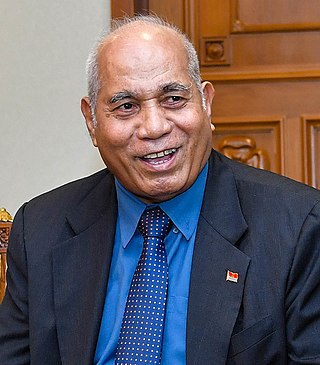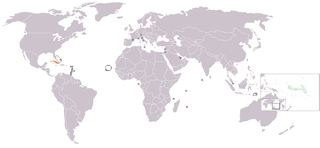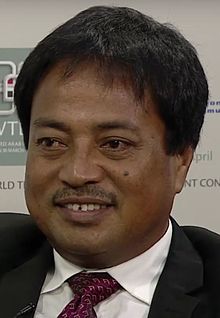
Politics of Kiribati takes place in a framework of a parliamentary representative democratic republic, whereby the Beretitenti, President of Kiribati, is both the head of state and head of government, and of a multi-party system. Executive power is exercised by the government, Beretitenti, and his cabinet, all MPs. Legislative power is exercised by the House of Assembly. The Judiciary of Kiribati is independent of the executive and the legislature. The Constitution of Kiribati, promulgated at independence on 12 July 1979, establishes the Republic of Kiribati as a sovereign democratic republic and guarantees the fundamental rights of its citizens and residents.

Anote Tong is an I-Kiribati environmental activist and former politician for the Pillars of Truth party with half Chinese heritage, who served as the fourth president of Kiribati, from 2003 to 2016. He won the election in July 2003 with a slim plurality of votes cast (47.4%) against his older brother, Harry Tong (43.5%) and the private lawyer Banuera Berina (9.1%). The elections were contested by the opposition, due to allegations of electoral fraud but the High Court of Tarawa had confirmed that there was no fraud. He was re-elected on 17 October 2007 for a second term (64%). In 2012, Tong was reelected for a third term, although with a significantly smaller percentage than in the previous two elections.

Ieremia Tienang Tabai is an I-Kiribati politician who served as the first president of Kiribati from 1979 to 1991. He previously served in the equivalent role, chief minister, under the colonial government from 1978 to 1979. Tabai returned to the House of Assembly in 1998 and represented Nonouti as of the 2024 election.

Teburoro Tito is an I-Kiribati politician and diplomat who served as the third president of Kiribati from 1994 to 2003.

Parliamentary elections were held in Kiribati on 22 August 2007 and 30 August 2007, within 23 constituencies to elect 44 MPs. Two other MPs are ex officio members.

Oceania is, to the People's Republic of China and the Republic of China, a stage for continuous diplomatic competition. The PRC dictates that no state can have diplomatic relations with both the PRC and the ROC. As of 2024, eleven states in Oceania have diplomatic relations with the PRC, and three have diplomatic relations with the ROC. These numbers fluctuate as Pacific Island nations re-evaluate their foreign policies, and occasionally shift diplomatic recognition between Beijing and Taipei. The issue of which "Chinese" government to recognize has become a central theme in the elections of numerous Pacific island nations, and has led to several votes of no-confidence.
Cuban-Pacific relations are diplomatic, economic, cultural, and other relations between the Cuba and countries situated in Oceania. In the 2000s, Cuba has been strengthening its relations with Pacific nations, which have, for the most part, responded favorably to Cuban medical aid in particular. The first Cuba-Pacific Islands ministerial meeting was held in September 2008 in Havana, with government members from ten Pacific countries—Kiribati, Tuvalu, Nauru, Solomon Islands, Fiji, Tonga, Vanuatu, Samoa, the Federated States of Micronesia and Papua New Guinea—attending. The meeting was a consolidation rather than a starting point of Cuban-Pacific relations.

Diplomatic relations between Kiribati and Cuba developed in the 2000s (decade). Like other countries in Oceania, Kiribati is a beneficiary of Cuban medical aid; bilateral relations between Tarawa and Havana must be viewed within the scope of Cuba's regional policy in Oceania.

The Cabinet of Kiribati is the cabinet of the government of the Republic of Kiribati.
Dr. Harry Tong, is an I-Kiribati politician with Chinese heritage. He was born in Tabuaeran, Line Islands and is the second child of Chinese immigrant Tong Ting Hai and Nei Keke Randolph, of Abaiang and Maiana. Harry Tong attended Wanganui Collegiate School in New Zealand, and then went on to complete his medical training at the Fiji School of Medicine.

Parliamentary elections were held in Kiribati on 21 and 28 October 2011. In the first round, exactly half of the 44 members of parliament were elected, with the remainder chosen in the proceeding run-off elections. 30 candidates were reelected, and four government ministers lost their seats. One seat had to go to a third round of elections due to two candidates tying in the second round. In the third round, Jacob Teem defended his seat against Rutio Bangao with just 27 votes difference.
Presidential elections were held in Kiribati on 13 January 2012, following two-round parliamentary elections held in October 2011. Incumbent President Anote Tong sought re-election to a third four-year term, ending months of speculation about his decision.

Taomati T. Iuta was an I-Kiribati politician. He was Speaker of the House of Assembly of Kiribati for the Ninth Parliament (2011–2015). He was the vice president of Kiribati from 1991 to 1994.
Tetaua Taitai was an I-Kiribati physician, politician and businessman. He was originally from the atoll of Tabiteuea North, but resided in the neighboring Tabiteuea South in the southern part of Kiribati. Taitai was the brother-in-law of former Kiribati President Teburoro Tito.
Beniamina Tinga was an I-Kiribati politician. He was Minister of Finance from 1994 to 2003. Tinga was sworn in as the vice president of Kiribati on 17 November 2000, following the death of his predecessor, Tewareka Tentoa, earlier in the month. He served as the vice president under President Teburoro Tito until 2003. In 2018 he was the sixth richest person from Kiribati.
A by-election was held in the Nukufetau constituency in Tuvalu on 28 June 2013. It followed the death of MP and Minister for Finance Lotoala Metia, who died suddenly on 21 December 2012.

Nei Meme, also known as Bernadette Meme Tong, is the former First Lady of Kiribati. She is married to Anote Tong, the former President of the Republic of Kiribati. They have seven children, among them Vincent Tong, elected MP in 2020.

Parliamentary elections were held in Kiribati on 30 December 2015, with a second round of voting for 25 seats on 7 January 2016. The result was a victory for the Pillars of Truth party, which won 26 of the 46 seats.

Taneti Maamau is an I-Kiribati politician who has served as the fifth president of Kiribati since 11 March 2016. Maamau is a member of the Tobwaan Kiribati Party. His policies are targeted at strengthening Kiribati's weak economy and alleviating social issues. His government announced the Kiribati Vision for 20 Years (KV20), which plans to develop the tourism and fishing industries with aid from foreign investors.

Parliamentary elections were held in Kiribati in 2024 to elect members of the Maneaba ni Maungatabu, with the first round held on 14 August and the second round held on 19 August.










